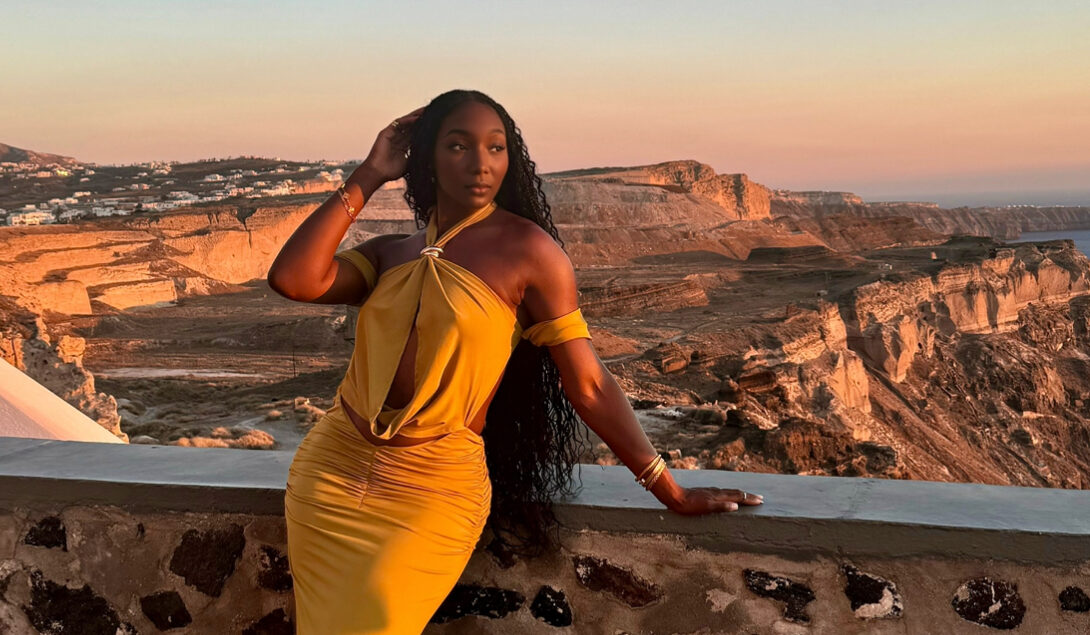Television host, cultural activist, and author Africa Yoon has a story to tell…and it involves plenty of kimchi. Born Suzanne Engo, the moniker “Africa” began as a nickname she received after arriving in the United States as the daughter of the Ambassador to Cameroon.
“When you grow up at the United Nations, sometimes people call you by your region,” said Africa. “For example, ‘Cameroon’ or ‘Suzy Africa.’ The nickname always found me, and because I did a lot of work on African issues and in the diaspora.”
Africa began to use the name professionally, and when she married, she changed her last name to her husband’s. However, having married a Korean-American man, Africa felt her ethnicity was being erased in her name.

“Had I kept Suzanne, I would have a European first name and an Asian last name; that isn’t me. I wanted to be announced clearly with a nod to where I was from. I have pride in being an African-American woman. I want it to be considered even from the moment someone reads my name. Africa, ah yes, Africa.”
As a child, Africa was briefed about many countries around the world. Due to the nature of her father’s work, she had to interact with foreign dignitaries from all over and was educated so that she could be aware and knowledgeable of their different cultures.
Today, Africa, her husband, and their three children split their time between Oahu, Hawaii and Busan, South Korea, where she finds it easier to live a healthy lifestyle supported by an abundance of nutritious yet tasty food. Her forthcoming book, The Korean, a memoir that blends the importance of self-care with the power of Korean food, is slated for a November 17 release. Africa was inspired to write the book during a postpartum struggle while healing and simultaneously grieving the loss of one of her twins.

“I got pregnant with twins twice. The second time, I lost one of my children. While I was pregnant I, channeled all my positive power so that the baby would come out and not be affected by my grief. In fact, when she came into the world, I spent the whole birth process laughing. Once she was out, signs that the grief was in me still began to show. I didn’t realize that was what was happening, but illness and imbalance of spirit showed up. Between a postpartum thyroid disorder and a Black woman’s medical healing challenge, that as she heals, she must fight for her right to be ill, I was so low.”
“I found myself was curled up on my bathroom floor, so anxious I didn’t want to leave the house. I said to myself, ‘Girl, get up.’ I looked in the bathroom mirror, saw myself, and honestly, I just felt so bad for myself, I gave myself a good pep talk. I said, ‘We write how this story ends, baby girl, and we will be okay.’ I decided that night I would begin anxiety therapy. I also decided I would write a book.”
As she began to get herself well, Africa remembered a time over a decade ago when her health had been suffering. She was 28 at the time, and living on the East Coast. She had gained 120 pounds in five years, working as an activist, helping everyone but herself.

“My mother had a Korean friend from church that took us to a Korean Mall in New Jersey, where they had these jade stone beds that heat up. My mum hadn’t been well during that time, and so we went there every Sunday. So here I was, not feeling well, and I was looking for that shop myself, but found it closed down. I walked down the hall, and a bakery worker offered me a sample of Korean bread with cream. While I was standing there binging on samples, I heard someone say, ‘You are too fat. You shouldn’t eat that bread!’ I turned around and found a petite elderly woman shouting at me.”
“The moment was holy, and I quickly knew that this was the Lord speaking through her to me. It was the truth, and so I took the chance and asked this woman to help me. She agreed, and after church on Sundays, we met to grocery shop together. The thing she insisted I eat the most was kimchi. I listened to her and, along with many other healthful shifts which you can find in my book, a year later I was 110 pounds lighter.”
Africa had first tried kimchi at the United Nations School when she was six years old, a youngster unaware of the food’s power. As an electric live food, kimchi now proved to be highly beneficial for Africa’s digestion. She swears by kimchi and still eats it to this day, highly recommending it to others, as well. When she found herself unwell for the second time, she retraced her steps, recalling all the things that had helped her the first time around. These tried and true methods worked again, and today, Africa is well and healthy.

There are several things Africa thinks the world could learn from Korean culture. For one, Koreans don’t talk when they eat. They remain calm and mindful when eating, which is key to health. Also, Koreans take care of their bodies, regularly visit spas called ‘jimjilbangs.’
As far as Korean cuisine, every meal is a small feast, with many side dishes, known as ‘banchan.’ From roots to fermented food, Korean cuisine is a nod to nature. Eating these diverse and flavorful foods is extremely beneficial for the health of the gut, and helps keep you energized and full.
One main point Africa hopes readers take from her book is the importance of self-care. She suggests that it be woven into every day, paying attention to our gut health and including sauna and heat in our wellness program. She highly recommends embracing a new culture when in need of change.

“We tend to gather a bunch of contextless tips. Usually, without context as to why you’re doing something, you will start and stop it. Knowing the whole story of why something is good for you means diving into the culture it came from to look at that culture’s entire story and lifestyle. That is what I did. I embraced kimchi, and it led me down this unique path to self-love, health, and true love. I took Korean culture on and remained African while doing so. My children and I are better for my embracing both cultures.”
“I think as women of color, we have had so much to sort out. I mean, what a busy history it has been; we didn’t have time to think about self-care. We were too busy negotiating and persisting. The Black woman is the strongest work of art that God ever did design. That we are standing through all we have been through and go through is to be celebrated. We must celebrate it, and the party is not one we should go out for. It is one we must stay home and tend to. WE DESERVE TO REST. Every day!”
Paperback and e-books versions of The Korean are currently available for pre-order through various outlets. For more information or to pre-order your copy, visit www.thekoreanbook.com.
Related: Meet Jessica Fry: The Black Woman Running Multiple Successful Businesses In Korea





